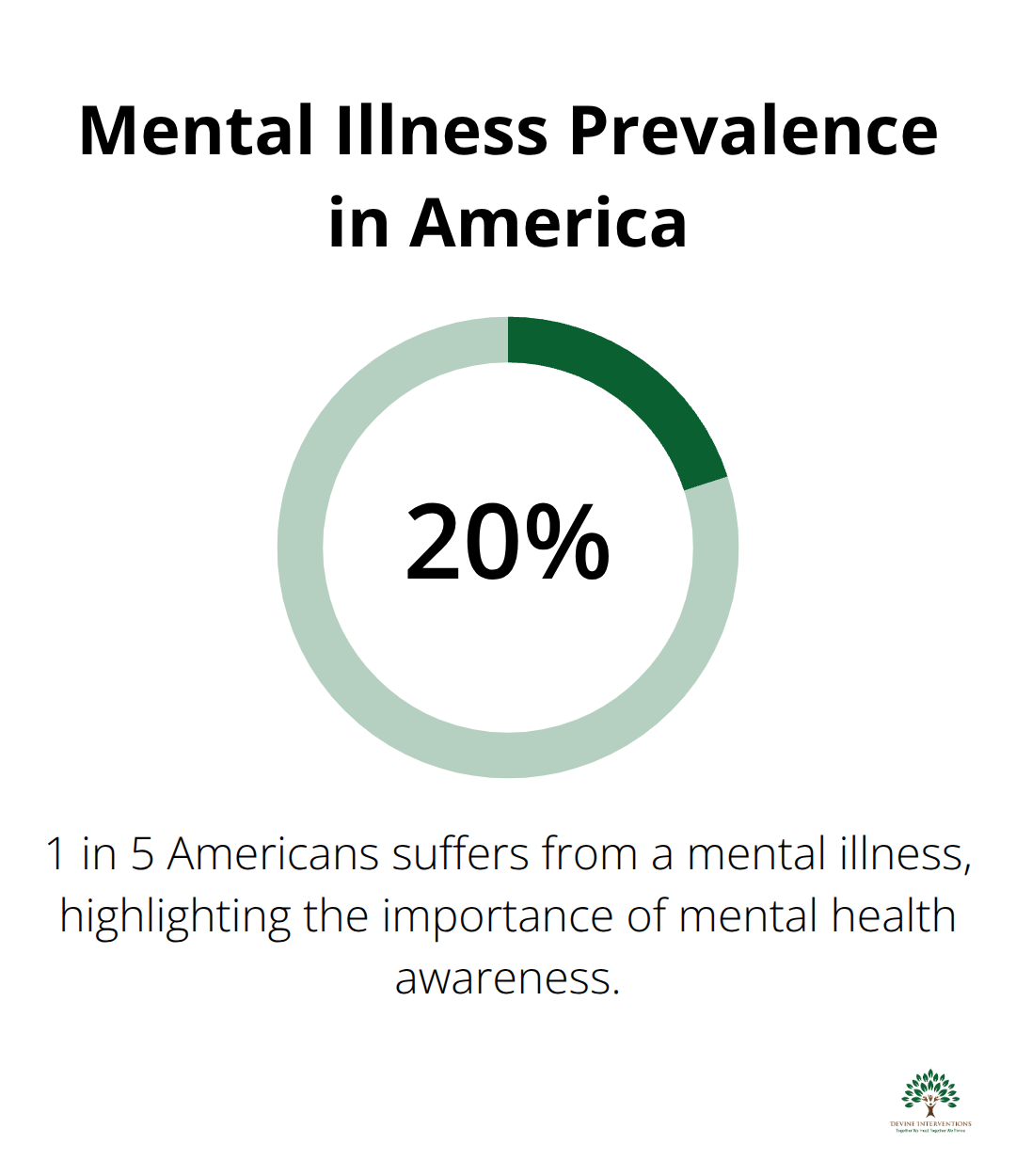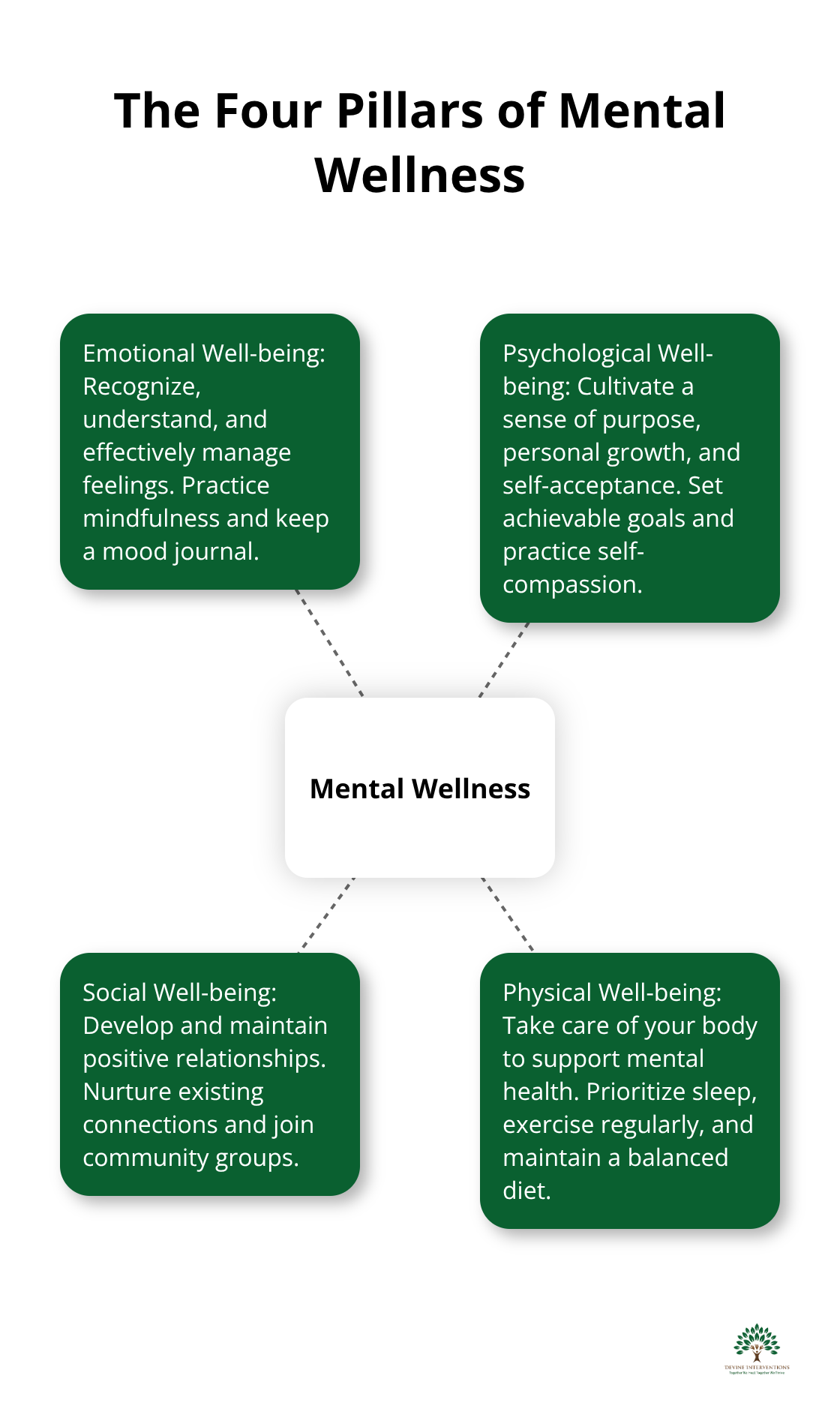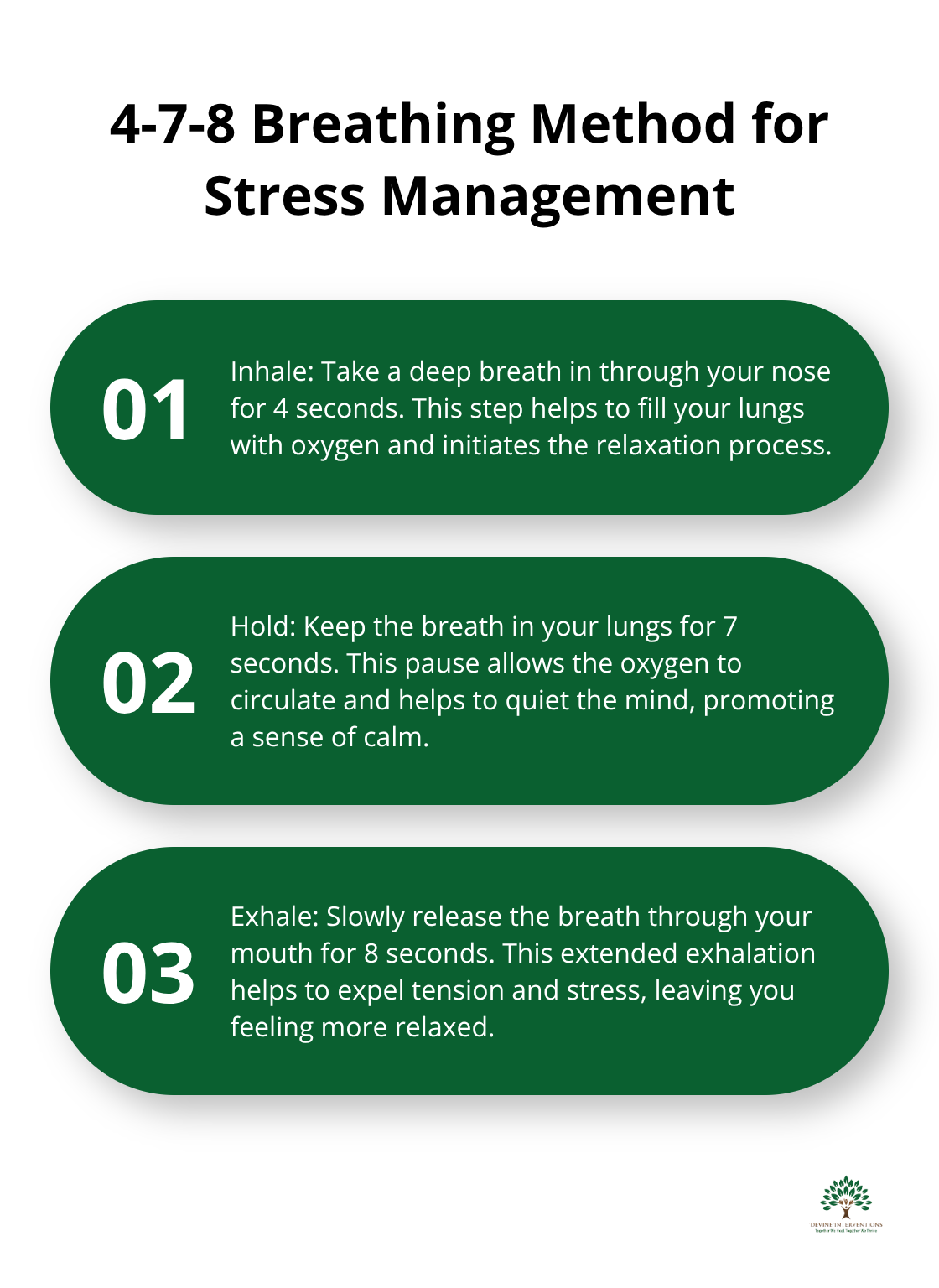Mental health and wellness are fundamental to our overall well-being, yet they’re often misunderstood or overlooked. At Devine Interventions, we believe that understanding the mental health wellness definition is crucial for everyone’s journey towards a balanced life.
In this post, we’ll explore what mental health truly means, its various components, and practical strategies for maintaining it. Whether you’re looking to improve your own mental wellness or support someone else’s, this guide will provide valuable insights and actionable steps.
What Is Mental Health?
The Essence of Mental Health
Mental health is the overall wellness of how you think, behave and manage your feelings. It represents a state of well-being that empowers individuals to cope with life’s challenges, work productively, and contribute meaningfully to their communities. At Devine Interventions, we view mental health as an integral component of overall health, shaping our thoughts, emotions, and actions in daily life.
The Multifaceted Nature of Mental Health
Mental health isn’t static; it fluctuates based on various factors. These include biological aspects (e.g., brain chemistry), life experiences (such as trauma or abuse), and family history of mental health issues. About 1 in 5 Americans suffers from a mental illness, underscoring the prevalence and importance of mental health awareness.

Dispelling Mental Health Myths
Misconceptions about mental health often prevent people from seeking help. Let’s address two common myths:
- Mental health problems indicate weakness: This notion couldn’t be further from the truth. Mental health conditions are legitimate, treatable health issues that require professional care, similar to physical ailments.
- People with mental health issues can’t lead normal lives: With proper treatment and support, many individuals with mental health conditions lead fulfilling, productive lives. Our team at Devine Interventions has witnessed numerous clients achieve personal and professional goals while managing their mental health effectively.
Recognizing Signs of Mental Health Issues
Identifying signs of mental health concerns is vital. These may include:
- Persistent sadness
- Excessive fears
- Extreme mood changes
- Significant alterations in eating or sleeping habits
If you notice these signs in yourself or a loved one, it’s crucial to seek help promptly.
Professional Support for Mental Health
At Devine Interventions, we offer a spectrum of services to support your mental health journey. Our offerings range from individual therapy to our Intensive Outpatient Program (IOP), providing personalized care that addresses your unique needs. Our experienced professionals utilize evidence-based practices to help you develop coping skills, manage symptoms, and enhance your overall quality of life.
Seeking help demonstrates strength, not weakness. Taking steps to understand and improve your mental health represents an investment in your overall well-being. As we explore the components of mental wellness in the next section, you’ll gain insights into the holistic approach necessary for achieving and maintaining optimal mental health.
The Four Pillars of Mental Wellness
Mental wellness extends beyond the absence of mental illness. It represents a state of emotional, psychological, and social well-being, enabling individuals to cope with stress, work productively, and contribute to their communities. Four key components form the foundation of mental wellness: emotional, psychological, social, and physical well-being.

Emotional Well-being: Navigate Life’s Ups and Downs
Emotional well-being involves the recognition, understanding, and effective management of our feelings. It focuses on the development of emotional intelligence and resilience. Here are practical ways to boost your emotional well-being:
- Practice mindfulness: Focus on your breath or surroundings daily. This can reduce stress and improve emotional regulation.
- Keep a mood journal: Track your emotions daily to identify patterns and triggers. This self-awareness can help you manage your emotional responses better.
- Express yourself creatively: Engage in activities like painting, writing, or music. Creative expression can serve as a powerful outlet for processing emotions.
Psychological Well-being: Cultivate a Positive Mindset
Psychological well-being involves a sense of purpose, personal growth, and self-acceptance. It focuses on the development of a positive relationship with yourself and the world around you. Here are strategies to enhance your psychological well-being:
- Set achievable goals: Break larger goals into smaller, manageable steps. The accomplishment of these can boost self-esteem and motivation.
- Practice self-compassion: Treat yourself with the same kindness you’d offer a friend. This can reduce self-criticism and improve overall mental health.
- Engage in lifelong learning: Challenge your mind by learning new skills or hobbies. This promotes cognitive flexibility and a sense of accomplishment.
Social Well-being: Build Meaningful Connections
Social well-being involves the development and maintenance of positive relationships with others. It focuses on feeling connected to your community and having a support system. Here are ways to improve your social well-being:
- Nurture existing relationships: Make time for regular check-ins with friends and family. Quality connections can significantly impact mental health.
- Join community groups: Participate in local clubs or volunteer organizations. This can provide a sense of belonging and purpose.
- Practice active listening: When you interact with others, focus on truly understanding their perspective. This can deepen connections and improve communication skills.
Physical Health: The Mind-Body Connection
Physical health plays a vital role in mental wellness. Taking care of your body can have profound effects on your mental state. Here are practical tips to improve your physical health:
- Prioritize sleep: Try to get 7-9 hours of quality sleep each night. Good sleep hygiene can significantly improve mood and cognitive function.
- Exercise regularly: Engage in at least 150 minutes of moderate-intensity exercise per week. Physical activity releases endorphins (the body’s natural “feel-good” chemicals), which can boost mood and reduce stress.
- Maintain a balanced diet: Focus on whole foods, fruits, vegetables, and lean proteins. A nutritious diet can support brain health and emotional stability.
These components of mental wellness are interconnected. A comprehensive approach that addresses all these aspects can support your journey towards optimal mental health. Whether you struggle with anxiety, depression, or simply look to enhance your overall well-being, professional guidance can provide personalized care and support. The next section will explore practical strategies to maintain and improve your mental health in daily life.
Practical Steps to Boost Your Mental Health
Mental health isn’t just about managing illness-it’s about active nurturing of your well-being. Small, consistent actions can lead to significant improvements in mental health. Here are practical strategies you can implement today to enhance your mental wellness.
Prioritize Self-Care
Self-care isn’t selfish-it’s essential. Start by identifying activities that genuinely recharge you. Practice mindfulness or meditation for mental clarity, engage in physical exercise like walking or yoga, and nourish yourself with healthy meals and snacks. The key is consistency. Set aside at least 30 minutes daily for self-care activities. Creating a self-care schedule helps many people stick to this habit.
Master Stress Management
Stress is inevitable, but how we handle it can make all the difference. One effective technique is the 4-7-8 breathing method: inhale for 4 seconds, hold for 7, and exhale for 8. Practice this for 5 minutes daily. Studies have shown that deep breathing techniques, including 4-7-8 breathing, can help lower cortisol levels, the hormone associated with stress.

Another strategy is to create a “worry time.” Set aside 15 minutes each day to focus on your worries. Outside of this time, when anxious thoughts arise, jot them down for later. This technique helps contain stress and prevents it from dominating your day.
Cultivate Strong Relationships
Social connections are vital for mental health. Make an effort to reach out to one person each day, even if it’s just a quick text or call. Quality matters more than quantity. Focus on nurturing relationships that are supportive and positive.
Consider joining a local club or group based on your interests. This can provide a sense of community and shared purpose. Group activities not only expand social circles but also provide a sense of belonging crucial for mental well-being.
Recognize When to Seek Help
While self-help strategies are valuable, sometimes professional support is necessary. If you experience persistent feelings of sadness, anxiety, or hopelessness that interfere with daily life, it’s time to reach out for help.
Professional support offers a range of services to support your mental health journey. Intensive Outpatient Programs (IOP) provide structured support while allowing you to maintain your daily responsibilities. For those needing more flexibility, individual therapy sessions offer personalized care tailored to your unique needs.
Seeking help is a sign of strength, not weakness. It’s a proactive step towards better mental health. Whether you’re dealing with a specific mental health condition or simply looking to enhance your overall well-being, professional guidance can provide the tools and support you need to thrive.
Final Thoughts
Mental health and wellness form the foundation of our overall well-being. We at Devine Interventions understand that everyone’s mental health journey is unique. Our comprehensive approach to care addresses the needs of children, adolescents, and adults through a range of services.
The mental health wellness definition encompasses emotional, psychological, and social well-being. It empowers individuals to face life’s challenges and thrive. Small, consistent actions can lead to substantial improvements in mental state over time (e.g., practicing mindfulness, nurturing relationships, and managing stress effectively).
Seeking help demonstrates strength, not weakness. If you struggle with persistent feelings or want to enhance your mental well-being, we’re here to support you. Our team of experienced professionals at Devine Interventions combines evidence-based practices with compassion to create personalized treatment plans that address your specific needs.







